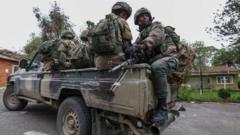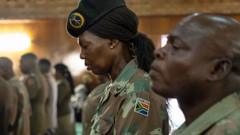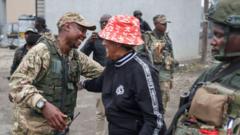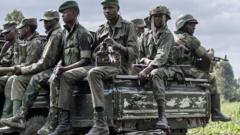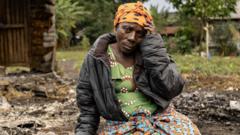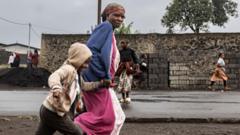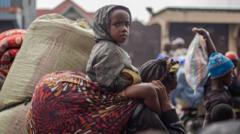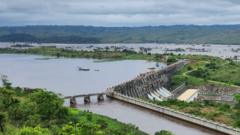Nearly 300 Romanian mercenaries, recruited to support the DR Congo army, have surrendered amid a rebel assault in Goma, shedding light on the poor conditions and severe disparities in pay compared to local troops as the conflict intensifies.
Romanian Mercenaries' Deployment in DR Congo: A Disastrous Venture

Romanian Mercenaries' Deployment in DR Congo: A Disastrous Venture
A detailed examination of the recent surrender of Romanian mercenaries in the Democratic Republic of Congo, highlighting the challenges they faced against the M23 rebels.
The past week has proven excruciatingly embarrassing for nearly 300 Romanian mercenaries hired to bolster the military efforts of the Democratic Republic of Congo (DR Congo). Their retreat, resulting from a fierce offensive by the M23 rebel group in the eastern city of Goma, has dashed their hopes of making lucrative earnings as paid soldiers.
Reports indicate that these mercenaries were contracted at an impressive rate of around $5,000 (£4,000) each month, while regular DR Congo military personnel earn only about $100 monthly, often going unpaid. The Romanians were engaged to assist in combatting the M23 rebels, who claimed to fight for the protection of the ethnic Tutsi minority within the DR Congo.
As combat intensified on Sunday night, the Romanian contingent found themselves seeking refuge at a UN peacekeeping base. Constantin Timofti, a co-ordinator for the group, recounted to Romanian media, "The national army gave up fighting, and we had no choice but to withdraw." Romania's foreign ministry confirmed that complex negotiations later led to the M23 handing over the Romanian soldiers to Rwanda.
Goma, strategically located on the Rwandan border, became a symbolic point for this tumultuous episode, as footage surfaced showing the mercenaries surrendering under watchful eyes of M23 commanders. One such commander, Willy Ngoma, harshly reprimanded a captured Romanian, questioning him about his impressive military compensation while pointing out the disparity with local troop salaries, emphasizing to the foreign fighters, "We are fighting for our future."
It remains unclear from where Ngoma acquired the $8,000 figure he quoted, but a contract shared with the BBC detailed a starting monthly salary of $5,000 during active duty and $3,000 during breaks. This agreement indicated an "indefinite period" of service, with mercenaries slated to take one month off after every three months of deployment.
The investigation into this situation revealed Asociatia RALF, the Romanian company behind these contracts, has been linked to unregulated activities across several African nations. A group of UN experts noted the organization employed a diverse set of operators from various countries, maintaining significant military training contracts.
Fiston Mahamba, co-founder of the disinformation site Check Congo, noted that most people initially assumed the mercenaries were connected to Russian forces due to their background—a misconception that fueled further speculation about their operations.
As military operations escalated, reports surfaced of Chaotic mission management burdening the Romanians, leading to unfulfilled service obligations, poor working conditions, and unverified recruits with scant military experience. Emerging testimonies from former soldiers indicated that many in their rank were not qualified for such roles, including individuals with unrelated job backgrounds such as firefighting.
The appointment of these private contractors also drew criticisms from the local government and the Congolese military, pointing to the overarching issues of command clarity among participating forces, ultimately deteriorating military strategy against M23 advancements.
Recent developments indicate that the quick loss of Goma underscores a deeply fractured defense paradigm in the DR Congo. Richard Moncrief from the International Crisis Group stressed the urgency of addressing the muddled chain of command and strategizing military responses against internal and external threats to restore stability.
As the dust settles on this disastrous venture, the fate of the remaining Romanian soldiers poses unsettling questions about the effectiveness and ethical implications surrounding foreign military involvement in the conflict-ridden territory.



